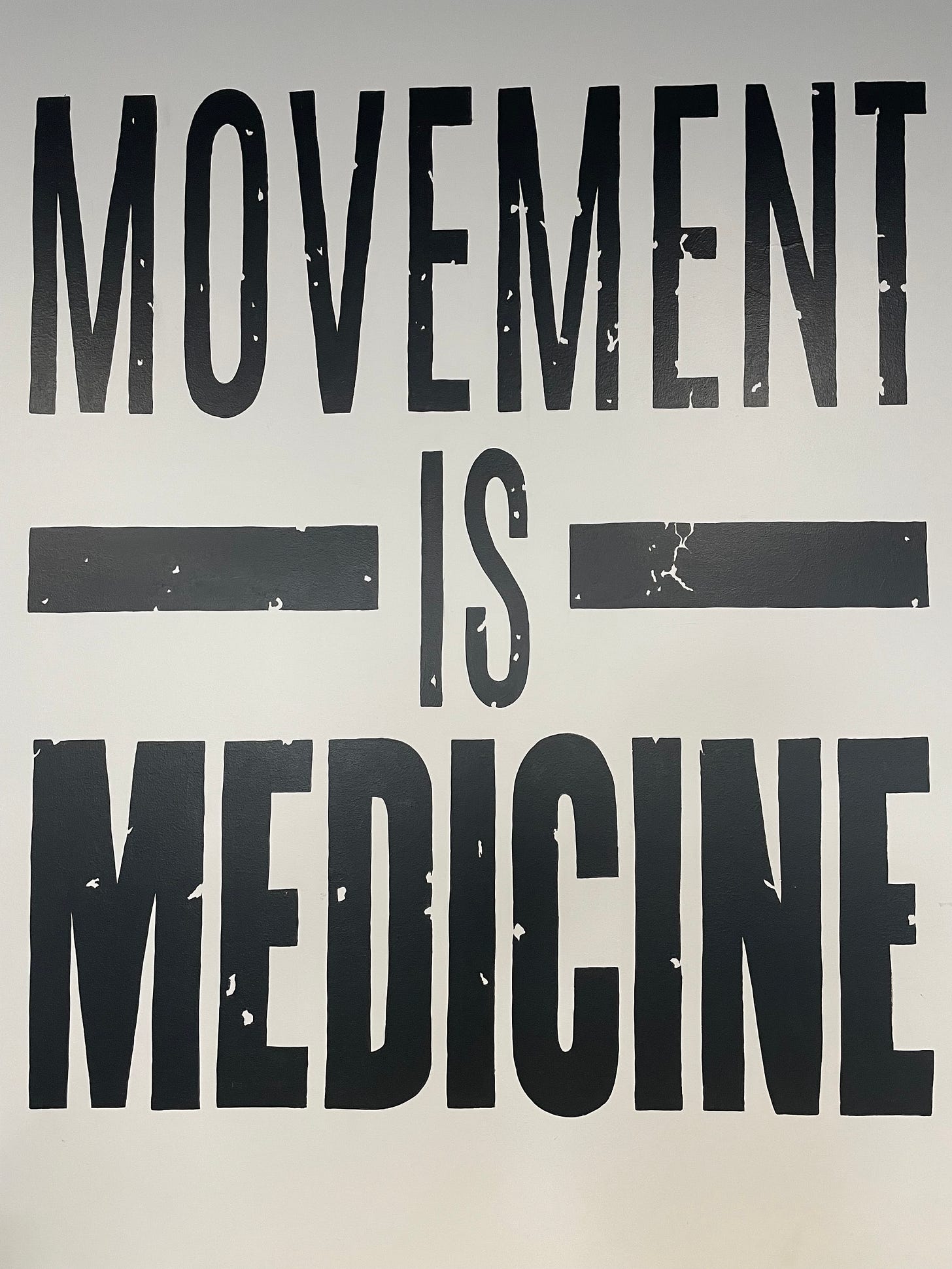I hope after last week you have all taken the time to sit down and thoroughly develop goals. I can’t stress how important it is to have aspirations in life. Good things will come to those who work hard for them. If you missed last week's article on goal setting you can read it here!
Movement Is Medicine
At first glance, you may think me saying “Movement Is Medicine” is just a catchy way to motivate you to work out more.
What if I told you that for most common diseases and disorders exercise is shown to be more effective than medication alone. People with Anxiety, Depression, Diabetes, High Blood Pressure, Obesity, etc all tend to have better outcomes when exercise (along with nutrition) is used as an intervention. We often search for quick and simple fixes to our conditions when in reality our bodies need consistent long-term solutions in the form of nutrition and exercise.
Do you or have you ever had aches and pains in your body that you can’t seem to get to go away? Maybe you wait it out and eventually reach for the pain medicine. This is equivalent to putting a bandaid on a cut that needs stitches. These sensations are often our body signaling a desire to move. We see it all the time when clients come in stating that their shoulder or knee is painful, yet by the end of their 60 min session they often leave feeling great. Performing appropriate and quality movement is essential to improving the function of our body and minimizing aches, pains, and injuries.
Our bodies are designed to move A LOT and in modern society, we tend to move as little as possible. This has been a major contributor to our current health issues but the great news is that it is completely under our control.
How Much Exercise do you need?
Exercise much like nutrition is going to vary from person to person. Your experience with training, the current level of fitness, and goals will all play a role in determining the best routine for you. Working one on one with a coach will be the best way for you to determine where to start and how to effectively train.
Strength Training
Strength training is essential to our health. While I could write for a long time on this topic here are the highlights for why you should be strength training:
Improvements in body composition (Lose Fat, Build Muscle, Increase Bone Density, etc)
Improvements in daily function (ability to walk, dress, carry groceries)
Improvements in confidence, energy levels, cognition, and other mental benefits.
This type of training should be completed at minimum 2 times per week while working the full body each day. Here is an example day for one of my clients:
Squat + Row
Warm-Up x 3 Rounds
- Thoracic Ext Over Med Ball x 8-10
- Banded Face Pulls x 10
- Wall Sit x 30s
Strength x 3 Rounds
- Goblet Squats x 8-10
- 3 point Row x 8-10/arm
- Plank Shoulder Taps x 8-10/arm
Accessory x 3 Rounds
- Split Squat x 6-8/side
- Landmine Press x 8-10/side
- Side Plank x 30s/side
Aerobic Training
For much cardiovascular training (“Cardio”) is the go-to. Running, walking, biking, etc are more accessible and less challenging to fit into your routine. We have also been told for years how important cardiovascular training is to our health. The main benefits are:
Improvements in heart health (decreased risk of heart attack and stroke)
Improvements in respiratory function
Improvement in symptoms of anxiety and depression
Increased energy levels and cognition
The general recommendation is 150 minutes per week of moderate to vigorous exercise. For my clients this will look like this:
Day 1
4-5 Rounds @75-80% Effort
Run, Bike, or Row x 3-4 mins
rest 2 mins
Day 2 & 3
45-60 min Brisk Walk Outside
Everyone I work with has a different structure based on their available time and goals. The main focus for exercise should be 2-3 days of strength training and 2-3 days of aerobic training. This will cover your bases for health and wellness without feeling like you have to spend all of your time working out.
Take-Home Messages
Consistent and appropriate movement is essential to ensure optimal performance
Movement is beneficial for almost all conditions
2-3 Strength Training Sessions per week
2-3 Aerobic Sessions per week
Movement is Medicine. Food Is Fuel.
One Day or Day One the Choice is Yours
Andrew Cataldo CSCS
Director - Performance Division
andrew@primarypreventionpt.com
https://www.instagram.com/andrewcataldo/
https://www.facebook.com/primarypreventionpt



